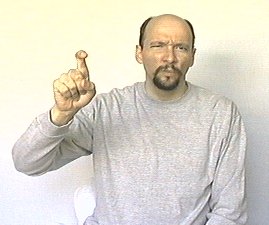American Sign Language: "need"
The sign for "need" can be used to represent a number of related concepts.
Sign: need / need to / must / should / ought-to / have-to
Handshape: "x"
Location: In front of you, off to the right side a bit.
Orientation: starts palm forward, ends palm down
Movement: "x" hand bends downward from the wrist
Non-Manual Marker (Facial expressions and or body language): Use a stronger facial expression to indicate a greater degree of imperative.
The faster, "harsher," and more exaggerated you do this sign, the more of a "requirement" exists to "do something." If you do this sign with a single, strong movement--it means need as in: must, have-to, "not much choice in the matter." If you use a double motion it means need as in: ought-to, should, "some choice in the matter."
"MUST or HAVE-TO" using a single motion:
The movement is downward. Starts and ends in an "x" handshape. Tje movement is mainly in the wrist not the arm.
"SHOULD, OUGHT-TO"
Use a double movement:
MUST/HAVE-TO:
Let me give you an exaggerated example of this concept showing an extreme "HAVE-TO":
Notes:
<< In a message dated 5/10/2012 6:34:36 A.M. Pacific Daylight Time, Paul Dunn writes:
Dear Dr. Bill,
Just wondering about the sign for "need to." I see the sign for must/have-to, ought-to/should, and need....but what about specifically "need to."
For example, "i need to do my homework" and "i need money" use "need" in slightly different ways. I supposed the homework sentence is the
same as saying "i must do my homework"....either way, I have Deaf friends that all sign "need to" by using the sign for "need" and then fingerspelling "to." They themselves are not sure if they are using ESL or ASL when doing this.
Thanks!!
- Paul
>>
Dear Paul,
In ASL the sign "NEED" automatically includes the concept of "to." Thus you and your friends do not need to fingerspell nor sign "to" when signing the concept of "need to."
- Dr. Bill
Also see: don't-NEED
You can learn
sign language
(ASL) online at American Sign Language University ™
Lifeprint.com © Dr. William Vicars








